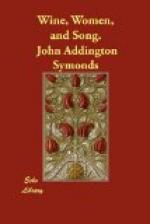Wafna! wafna!
O Fate most foul, what hast thou done?
The joys of man beneath the sun
Thou hast stolen, every one!
XXI.
The transition from these trivial and slightly interesting comic songs to poems of a serious import, which played so important a part in Goliardic literature, must of necessity be abrupt. It forms no part of my present purpose to exhibit the Wandering Students in their capacity as satirists. That belongs more properly to a study of the earlier Reformation than to such an inquiry as I have undertaken in this treatise. Satires, especially medieval satires, are apt, besides, to lose their force and value in translation. I have therefore confined myself to five specimens, more or less closely connected with the subjects handled in this study.
The first has the interest of containing some ideas which Villon preserved in his ballad of the men of old time.
DEATH TAKES ALL.
No. 56.
Hear, O thou earth, hear,
thou encircling sea,
Yea, all that live beneath
the sun, hear ye
How of this world the bravery
and the glory
Are but vain forms and shadows
transitory,
Even as all things ’neath
Time’s empire show
By their short durance and
swift overthrow!
Nothing avails
the dignity of kings,
Naught, naught avail the strength
and stuff of things;
The wisdom of the arts no
succour brings;
Genus and species help not
at death’s hour,
No man was saved by gold in
that dread stour;
The substance of things fadeth
as a flower,
As ice ’neath sunshine
melts into a shower.
Where is Plato,
where is Porphyrius?
Where is Tullius, where is
Virgilius?
Where is Thales, where is
Empedocles,
Or illustrious Aristoteles?
Where’s Alexander, peerless
of might?
Where is Hector, Troy’s
stoutest knight?
Where is King David, learning’s
light?
Solomon where, that wisest
wight?
Where is Helen, and Paris
rose-bright?
They have fallen
to the bottom, as a stone rolls:
Who knows if rest be granted
to their souls?
But Thou, O God,
of faithful men the Lord,
To us Thy favour evermore
afford
When on the wicked judgment
shall be poured!
The second marks the passage from those feelings of youth and spring-time which have been copiously illustrated in Sections xiv.-xvii., to emotions befitting later manhood and life’s autumn.
AUTUMN YEARS.
No. 57.
While life’s April blossom
blew,
What I willed I then might do,
Lust and law seemed comrades true.
As I listed, unresisted,
Hither, thither, could I play,
And my wanton flesh obey.




